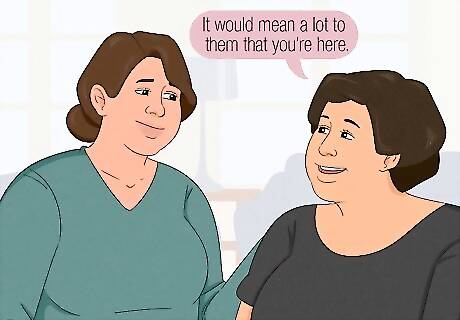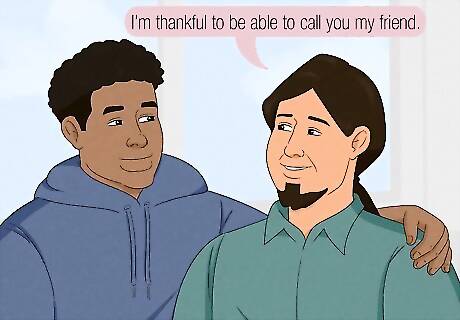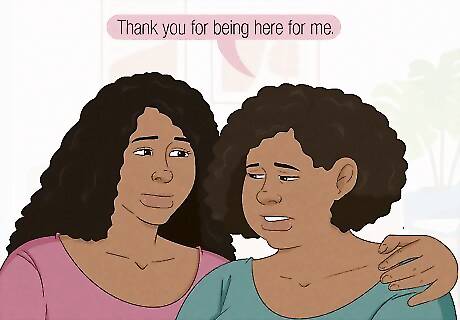
views
“Thank you for the kind words.”

A simple “thank you” is sometimes all you need to say. It can be hard to express your feelings or emotions when you’re grieving, especially to those who aren’t close to. If you’re unsure what to say when someone says, “I’m sorry for your loss,” stick with a simple expression of gratitude. “Thank you for your thoughts and prayers.” “Thank you for reaching out.” “I appreciate it.”
“I appreciate your support.”

Share how much you value their condolences. If the kind words of this individual mean a lot to you, don’t hesitate to say so. Let them know that you appreciate and cherish their support. This is a great way to respond to a friend, relative, or colleague. “I’m glad you reached out.” “Your concern means the world.” “I appreciate all the well wishes.”
“It’s been tough, but I’ll be alright.”

Confide in a loved one about how you’re really doing. Losing someone is hard, and it’s okay to be vulnerable. If you feel comfortable, try sharing your feelings in response. This reply is especially helpful if you need extra support or a shoulder to lean on. “I won’t lie. It’s been hard. But we’ll get through it.” “I’m taking it one day at a time.” “Thanks. I know they’re in a better place now.”
“I’m grateful for all the support.”

Acknowledge the community surrounding you. When someone passes away, seeing all the support you receive can be overwhelming. Perhaps you learn that your loved one touched more lives than you originally thought. This positive but simple response is a wonderful way to show appreciation to those you may not know well. “It’s comforting to have people around me.” “It’s nice to know there are people to turn to when you need them most.” “I’m at a loss for words because of how generous everyone’s been.”
“I’m doing okay. Thank you.”

Express gratitude while emphasizing that you’re alright. More often than not, people who say, “I’m sorry for your loss” are concerned about your well-being. This response is an excellent way to briefly state that you’re okay without diving into details, all while sharing how much you appreciate their concern. “I’m getting by. Thanks for checking in.” “I’m touched by your compassion. Thank you.” “Thank you for taking the time to ask. I’m alright.”
“I know it’s been difficult for you too.”

Recognize that they may be struggling too. Chances are you’re not the only one grieving, and it’s perfectly okay to acknowledge that. If you know the person sharing their condolences was also close to the deceased, don’t hesitate to offer support. “I’m sorry. I know you cared about them too.” “I know you also loved them.” “I know you understand what we’re going through.”
“It would mean a lot to them that you’re here.”

Reference the deceased's relationship with them. If you’re not sure what to say regarding your emotions, redirect the conversation to the person saying, “Sorry for your loss.” This is a great way to form community and remember someone who’s passed. “They talked a lot about you. Thank you for coming.” “They really admired you.” “Thank you. They’d appreciate you coming.”
“I’m thankful to be able to call you my friend.”

Hold friends close by thanking them for their support. You need love and support more than ever, so let those close to you know how much they mean to you. Not only does this response show how much you love them, but it also expresses how thankful you are for their friendship. “I’m so lucky to have you by my side.” “Thank you for being here for us.” “Thank you. I’m not letting you leave my side!”
“I don’t know what I would do without you.”

Be vulnerable and express admiration to loved ones. If a close friend or relative says, “I’m sorry for your loss,” don’t be afraid to say how you truly feel. Use this response to let them know they’re helping you stand tall and be strong through this difficult time. “I’m so grateful for your support.” “Your support means the world to me.” “You always reach out when I need you most.”
“Thank you for being here for me.”

Share how much their presence means to you. When someone passes away, it can be easy for people to back away because they’re unsure what to do or say. Let this supportive person know that their support is greatly appreciated with this response. “Words cannot express how much your support means to me.” “I wouldn’t be able to get through this without you.” “You’ve been a blessing through all of this.”
Say nothing and offer a hug.

Sometimes, the best way to express your emotions is with an embrace. If you’re responding to a “sorry for your loss” in person, ask if it’s okay to hug them. Finding words to express your feelings can be difficult, and sometimes a hug is the best way to let it all out and say, “Thank you. I needed to hear that.” If you’re texting someone, share a hug GIF or ???? emoji to send them a virtual hug.


















Comments
0 comment